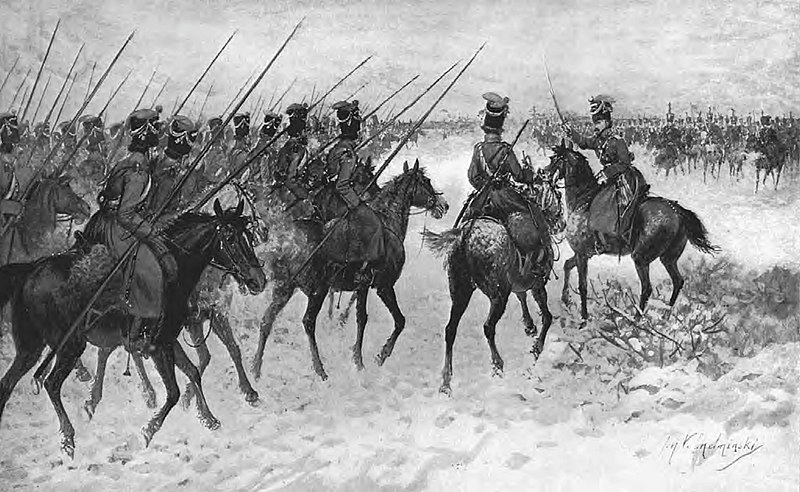A letter to his banker …
At Czernigow (Chernihiv), 8 December 1812.
I only received your letter of 16 September yesterday, with two others from my father, one of 17 June and the other dated 4 September.
For a long time now I have been supplied with nothing but grief and bitterness.
I am delighted to learn that Mr. Bonet has escaped the debacle …
***
Between 8 December 1812 and 14 March 1813, the date of the following letter, the correspondence was interrupted, and, as we can see, the previous letter was quite terse. From other sources, however, we do know that Lieutenant Boudousquié was wounded by several lance thrusts during the retreat, which had commenced in earnest on 25 October 1812.
Davout and I Corps had first formed the rearguard, harassed by Platov’s Cossacks. This rearguard halted the Russians at Kolotskoi (31 October), then at Vyazma (3 November). It was then Ney and III Corps which ensured Davout’s respite.
The French army regrouped at Smolensk, pillaged what was left in the storehouses, so that, when Ney arrived three days later, he found almost nothing (12 November). The cold was beginning to take a very serious toll on the men; as for the horses, there were almost none left.
At Krasnoye, Kutuzov cut Prince Eugène off from Napoleon who, at the cost of a vicious counter-attack, re-established contact (16 November). However the next day, Davout arrived in his turn and was forced to fight his way through the Russians (17 November). Finally, when Ney arrived at Krasnoye, Davout had evacuated the town by order of the Emperor and the rearguard was separated from the army. It was precisely on that day, 18 November, that Lieutenant Boudousquié was taken prisoner. The following day, Ney, after having held out all day against the assaults of the Russians, crossed the Dnieper at night.
***
In the district of Czernigow (Chernihiv), south of Smolensk, 14 March 1813.
To Mr. Carayon de Latour, banker.
I finally find the opportunity to inform you that I am a prisoner, and not dead, as my silence must have led to assume. Please inform my parents, to whom this fear no doubt causes severe grief …
I have written several letters to my family, but almost without hope of them reaching their destination, and I do not yet know their outcome. I am sending you this one for more assurance. Mr. Rall, a banker at the court of St. Petersburg, whom I have asked to send it to you, having already passed on sums to several French prisoners, as I have no doubt that you will be able to correspond with him through the intermediary of Mr. Perregaux or someone else; and I beg you to send him the aid which will please my parents to send me, and which I am in the greatest need of.
If there were any particular exchanges, which I dare not hope for, I rely strongly enough on your kindness and on the affection of my parents to believe that you would leave no stone unturned to explain this to me.
Farewell, Sir, please reassure my parents about my fate: I am doing very well and have recovered from my injuries …
***
(This) 8 May. Druboff.
I received your letter from Liulitschy (?) today and I am hastening to answer it immediately. I enclose herewith that of Mr. S … which will make you jump for joy, since at least it assures you that your parents will be informed of your plight …
You will think of me in your hours of rest. Anglomania will cover you with its wings, which are peace, gentle philosophy. I hope that mine will lead me to a safe harbour, for P. Kutuzov being dead, I do not think I can return to the army …
My friend, prepare to make another trip to Tamboff, a town where all the prisoners are gathered, according to what the Vice-Governor of Chernigoff (Chernihiv) told me. I would like this to occur as tardily as possible …
Source : Correspondance du Lieutenant Boudousquie, in De Cahors à la Moskowa, Imprimerie Maugein et Cie, 1974, pp. 56-58.

Leave a comment